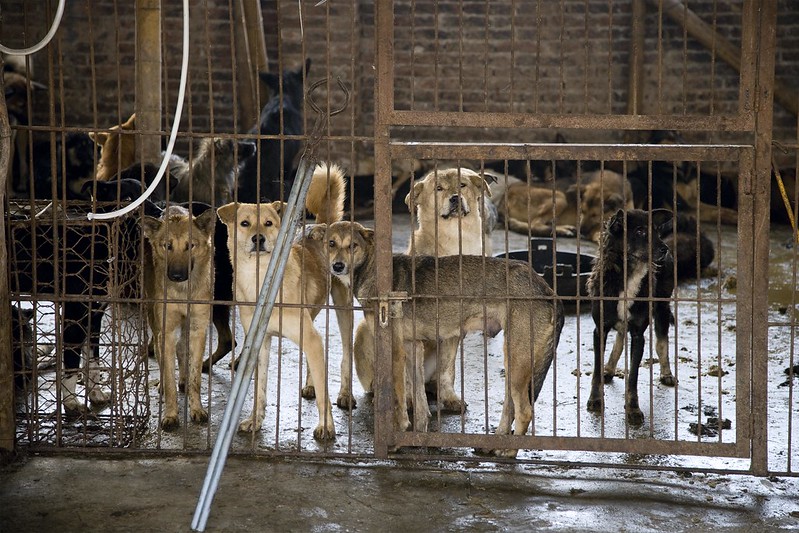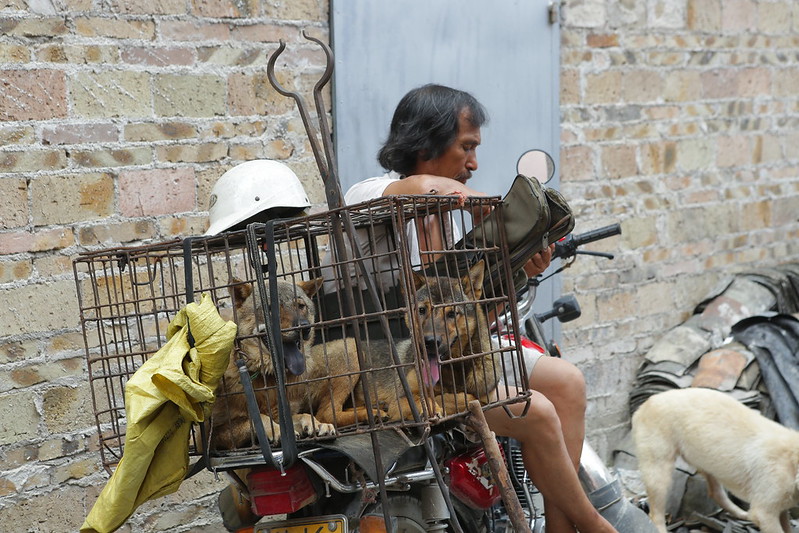Yulin festival: what we know, what we hear and what we fear
23 May 2017
With rumours circulating of a ban at this year’s Yulin dog meat festival, we look at the issues a potential ban raises.
Reports have suggested that dog meat restaurants in Yulin will be banned from selling dog meat in the week preceding the annual festival.
Here’s all the information we have:
Until it’s officially banned – it’s going ahead:
While respected sources have staked reputations on the ban – until it’s officially confirmed we can’t be sure what to expect.
It’s being said that there are good reasons why there is no statement at present – the authorities don’t want it leaked. However, even if true, without it written in black and white, it allows authorities to backtrack at a later date.
While we’ve also heard the ban outlined by our own contacts – we still can’t rule out the possibility of rumours or disinformation at this point.
Certainly this BBC report gives us food for thought.
Rumours have taken hold in the past that the festival is over – only for it to prove not to be the case. However, our experience suggests this is the most substantial rumour yet.
But there is still no one from the Yulin authorities willing to say so on record. Until that happens, nobody can be sure what will happen this year.
But could Yulin and China really have had enough of dog meat eating?
It is possible. Make no mistake – dog snatchers, traders, slaughterers and restaurants have few friends. This is a hated industry.
The vast majority of Chinese do not even eat dog. An Animals Asia survey from 2015 showed that even in the cities and provinces where dog meat eating was most prevalent (including Guangxi which includes Yulin) almost half of respondents had not eaten cats or dogs in the past two years. Among those who had, half had eaten it only once or twice a year.
Further strengthening the national case against dog meat eating is the rise in companion animals and the change in attitudes towards dogs and cats in recent years. Thanks to programmes like Dr Dog and Professor Paws, canines are increasingly respected and seen as capable of contributing to society, thanks to their work with the disabled, the sick, the young and the elderly.
In contrast to this, most dogs used in the meat industry are snatched from loving families or the streets, with people living in fear of their companions simply disappearing, knowing that they are likely facing horrendous cruelty.
China could do without the cruelty and crime that this industry perpetuates. Banning the dog and cat meat industries would solve far more problems than it would cause.
There are so many ways round a ban
With the authorities yet to confirm rumours, it is unclear exactly what form any ban would take. But it’s likely that dogs could still be slaughtered and consumed during the festival period – albeit on a smaller scale.
Our sources suggest the ban would apply to restaurants, markets and slaughterhouses. But this leaves the door open to the possibility of street vendors continuing to sell, restaurants offering “takeaway”, or markets selling increased volumes before or after the ban is due to take place.
It’s also possible that the ban would only apply to central Yulin. With traders in the suburbs and nearby cities such as Beilu claiming they have heard nothing, dog meat eaters could simply travel to consume.
Even if the ban really is enforced, we could still see images of dogs being consumed publicly in Yulin during the summer solstice. At this point we can rule nothing out.
Cats aren’t covered
The Yulin festival’s original name – before being pushed underground – was the Yulin Lychee and Dog Meat Festival, but other products are consumed such as beer, rice wine and even cats.
While it’s true a small number of cats are eaten each year, we believe it’s unlikely significantly more cats will be slaughtered and consumed if any ban on dog becomes official.
However, we cannot rule out the possibility of a vindictive backlash that could see cruelty used as a way of protesting the ruling and taunting campaigners.
Could there be a backlash if ban rumours are true?
Yes, and this is a real concern. It’s also a reminder that we cannot allow this to be seen as the west telling the east how it should behave. If this is promoted as the west making China follow its lead, then future progress will be slower and the backlash greater.
Remember, Chinese animal lovers have long campaigned to see the end of the Yulin festival and cat and dog meat eating in China as a whole. We must realise that compassion – like cruelty – has no borders and that what is being achieved to reduce and one day end the trade is because of animal lovers all over the world coming to the same conclusions.

But I read….
Take it all with a pinch of salt. The Yulin festival and much of the reporting around it has long been muddied by a lack of information, skewed by a lack of locally-based reporters and further confused by internet rumours.
Do your own research from reputable sources and suspend your conclusions till all the facts are at hand.
Even if the festival ends, it won’t stop dogs dying.
As long as dog meat eating is legal in China, it will continue year round in Yulin and elsewhere. So while a temporary ban would go a long way to ending what remains of the Yulin dog meat festival, dogs would continue to be slaughtered every other day of the year.
Reports estimate 10 million dogs are slaughtered per year in China. This is what dog lovers have to focus on. If it’s possible for one city to feel they’ve had enough and erect a short-term ban, what’s stopping the rest of the country doing so permanently?
Is it just a rumour? Will it mean cats are eaten instead? Could they eat dogs on another day? Could they move the festival to another location?
Not if all dog and cat meat trading are banned. That must be our aim.
Nation-wide efforts are now required. We must change attitudes toward dogs, improve legislation and enforcement of existing laws and finally stop the cruel dog meat industry everywhere, once and for all.
BACK








